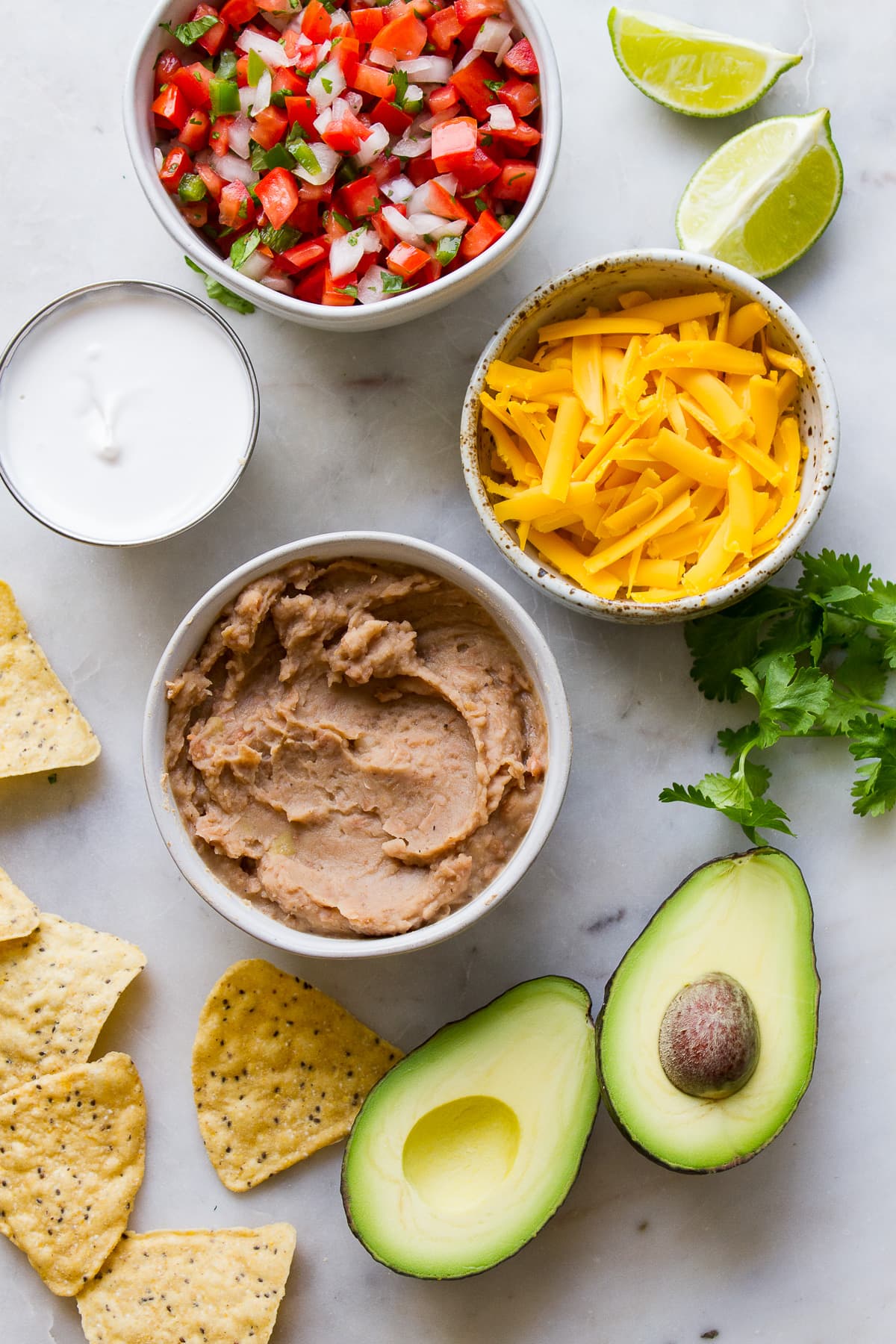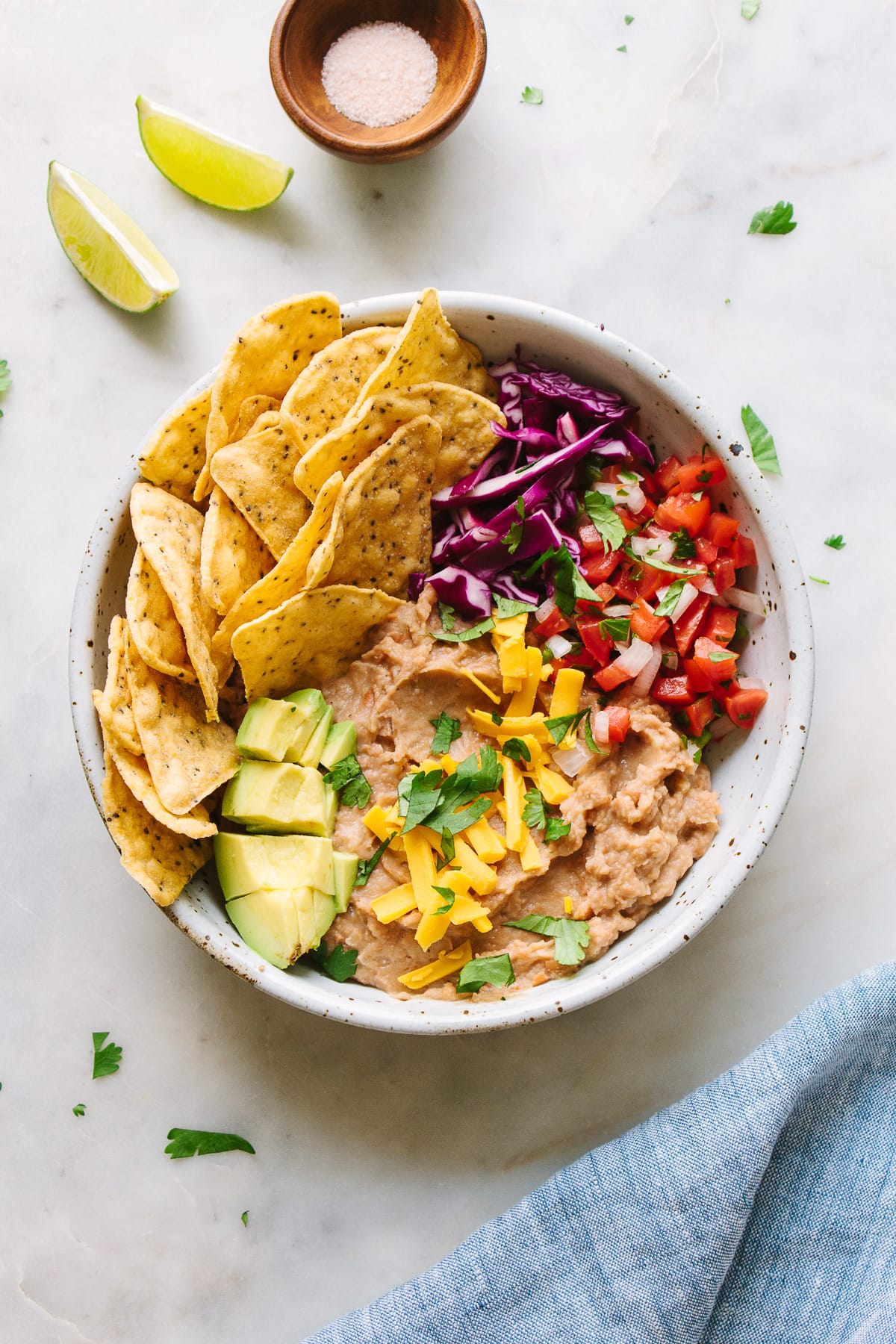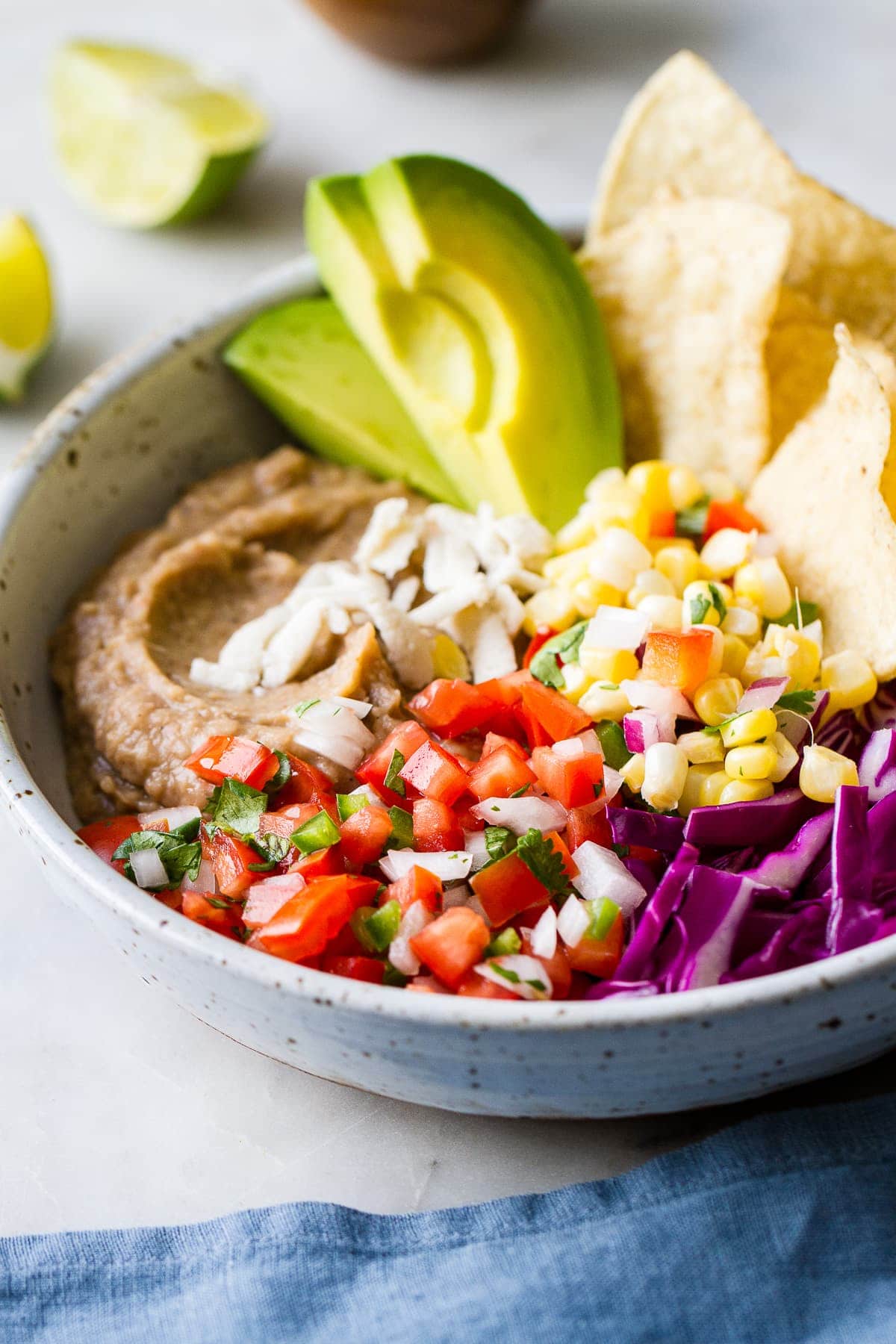Quick + Easy Nacho Bowl (Vegan)
This deconstructed Nacho Bowl is quick and easy to make and perfect for snacking or a light meal. It’s a customizable recipe that’s healthy, vegan and gluten-free!

This easy nacho bowl recipe has been my obsession lately. It features homemade refried beans, fresh salsas, creamy avocado, vegan cheese, cabbage, and lime scooped up with crunchy tortilla chips.
I’ve been making refried beans like crazy and have tons left over, but I don’t mind because this simple, deconstructed nacho bowl has been my absolute favorite way to use them up!
It’s filling and delicious, and if you can have everything prepped in advance it’s ready in a cinch!

Ingredients You’ll Need
In this easy recipe, there are really no rules; use as much as you like of anything, mixing and matching to your heart’s desire!
Here is everything you will need:
- Refried Beans – Use homemade Instant Pot Refried Beans or Slow Cooker Refried Beans using dried beans or this Easy Stovetop Refried Beans, which uses canned beans. These recipes can all be made with pinto or black beans. Canned refried beans are great too if you don’t want to make your own! These Instant Pot Black Beans would also be great!
- Pico de Gallo – Make homemade Pico de Gallo or use a prepared one from the grocery store for convenience.
- Corn Salsa – Fresh Corn Salsa is easy to make from scratch and adds a wonderful sweet flavor, but feel free to omit it.
- Vegan Cheese – My favorite is Myioko’s Fresh Vegan Mozzarella. You can crumble it or shred it. Daiya is pretty good, too. I prefer using the blocks and shredding myself versus buying pre-shredded. Pre-shredded sting cheese is coated, making it hard. When you shred it yourself using the blocks, it’s much softer and pleasantly textured.
- Red Cabbage – For a little extra crunch and color, you can sub with green cabbage or shredded romaine or lettuce.
- Avocado – I just couldn’t have a nacho bowl avocado. It adds another layer of flavor and creaminess.
- Cilantro – Adds more freshness and herb flavor.
- Lime – A squeeze of lime over top adds a nice finishing touch!
- Tortilla Chips – Last but not least, use your favorite tortilla chips.
- Optional toppings – Sliced olives, homemade Sriracha Cream Sauce, or this Vegan Sour Cream for a little extra creaminess and tang.

How To Make A Nacho Bowl
Making nacho bowls is super simple. I’m not even sure this is a recipe; it’s more of a template.
- Cook the beans. If you’re making them from scratch, these can easily be made ahead of time and warmed up on the stove before assembling your nacho bowls.
- Prep the salsa. Make the Pico de Gallo and corn salsa. Again, both of these can be made in advance, up to 1 – 2 days.
- Prep the remaining produce. Shred the cabbage cabbage and slice the avocado.
- Assemble the nacho bowls. To assemble the bowls, arrange the refried beans, pico de gallo, corn salsa, small handful of red cabbage, and avocado in a serving bowl, and top with cheese and place chips on one side of the bowl.
Top Tips
- If you prefer to heat your nachos in the oven so the cheese will melt, the recipe card below will give detailed instructions for warming in the oven.
- Use as much of anything as you like.

More Quick + Easy Recipes!
- Stuffed Avocados
- Black Bean Fajitas + Guacamole
- Quinoa Stuffed Bell Peppers
- 7 Layer Mexican Dip
- Quick & Easy Black Bean Tacos
- Healthy Texas Caviar
If you try this nacho bowl recipe, please let me know! Leave a comment and rate it below. I love to hear what you think, or any changes you make.
PrintDECONSTRUCTED NACHO BOWL (QUICK + EASY)
This deconstructed nacho bowl recipe is a perfect way to use refried beans and fresh salsas for a delicious light snack or meal!
- Prep Time: 10 min
- Total Time: 10 minutes
- Yield: Serves 3 – 4 1x
- Category: Entree, Snack
- Cuisine: Vegan, Mexican, Tex-Mex
Ingredients
- 2 cups easy refried beans or 1 can (15oz) refried beans*
- 1 cup pico de gallo
- 1 cup fresh corn salsa
- 1 cup red cabbage, shredded
- 2 avocados, diced or sliced
- 1/2 – 1 cup vegan cheese
- 4 cups tortilla chips
Garnish
- lime wedges
- cilantro, chopped
- vegan sour cream, optional
Instructions
Cook the beans. If making them from scratch they can easily be made ahead of time and then warmed up on the stove before assembling your nacho bowls. Using canned refried beans, see notes.
Prep the salsa. Make the Pico de Gallo and corn salsa. Again, both of these can be made in advance, up to 1 – 2 days.
Prep the remaining produce. Shred the cabbage cabbage and slice the avocado.
Assemble the nacho bowls. To assemble the bowls, arrange the 1/2 cup refried beans, 1/4 pico de gallo, 1/4 corn salsa, small handful of red cabbage, and 1/2 avocado in a serving bowl, top with cheese and place 1 cup of chips on one side of the bowl.
If you prefer to heat in the oven:
- Preheat oven to 375 degrees F.
- Add the serving to refried beans to individual bowls, top with cheese and add a handful of chips on the side.
- Place in oven and bake for 5 – 8 minutes.
- Remove from oven, add the salsa, red cabbage and avocado, along with the other garnishing and enjoy!
Makes about 3 – 4 nacho bowls.
Notes
This is more of a template than a recipe. Feel free to adjust the amounts per serving to suit your needs.
*Canned Refried Beans: If using canned refried beans, heat the beans over medium low, add 1/4 cup of water, 1/4 teaspoon cumin and 1/4 teaspoon chili powder, stir and cook until warmed through. Taste for seasoning adding more spices as needed. Add salt & pepper to taste.
These Instant Pot Black Beans would also be great!
Nutrition information is calculated without vegan cheese. Check the label and add the serving amount to the total.
FOLLOW TSV on Facebook, Instagram, Pinterest, Youtube, Subscribe (email), or RSS for more recipes and inspiration!


Who doesn’t love a recipe to enjoy with chips! My family would enjoy this. Thanks for sharing!